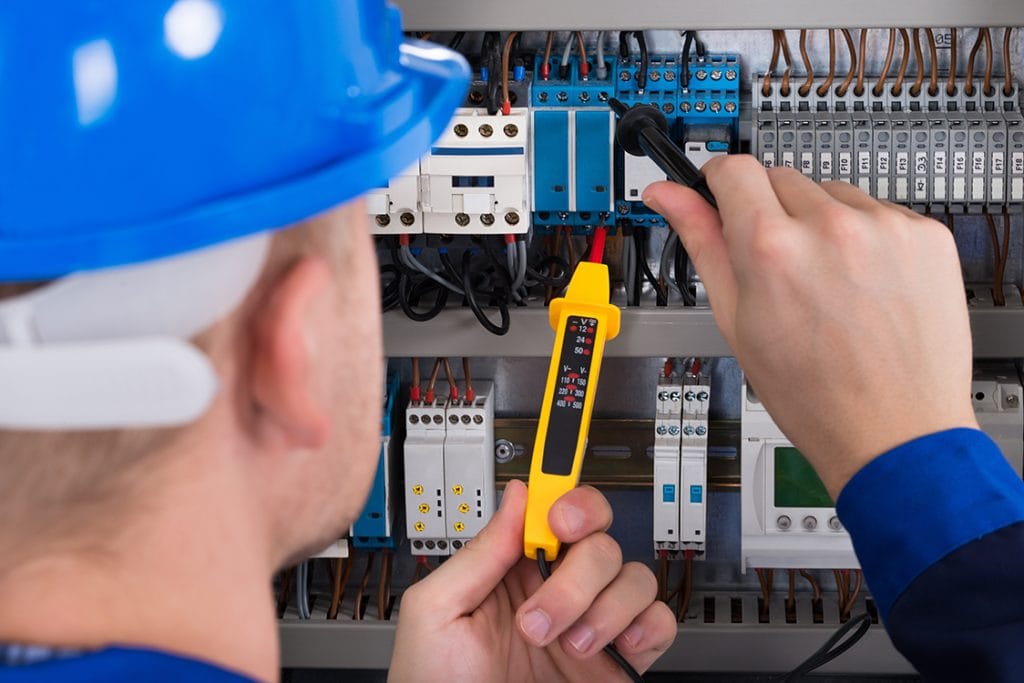
Good electrical work is at the heart of every building. Not only does proper electrical wiring bring the building to life and make virtually anything possible inside, but it also keeps occupants safe by adhering to all relevant codes and restrictions.
Not all electrical work is the same, however. An electrician who has wired thousands of houses isn’t necessarily qualified to offer commercial electrician services, and vice versa. There are notable differences in these types of projects, and you need to have the right contractor on the job to make sure the results are what you expect.
To work with a commercial electrician who is proven to deliver great results time after time, make sure Varney is your first call. You will be in the right hands with the Varney team and your commercial or industrial wiring project will be completed properly, safely, and in a timely manner.
An Important Starting Point
Before getting into the differences between the types of electrical work that can be done for various kinds of buildings, it should be noted that it is all important. No matter what kind of electrical work is being done, it’s critical that the work lives up to a high standard and meets all code restrictions and expectations. Poor electrical work is not only going to let down the user, but it also poses a significant danger to anyone on the premises.
If you are going to be hiring an electrician, always make sure your chosen contractor holds all of the necessary licenses and insurance to do this work legally. Don’t accept any excuses on that point, as it’s simply too important to ignore. A licensed electrician has a professional reputation and career to worry about, and you can expect that the work will be completed properly as a result.
Basic Introductions
While the names somewhat tell the story of what these three types of electrical work are and where they are performed, the points below make things perfectly clear –
- The work done by a residential electrician takes place in and around homes. In some cases, that will mean wiring up a new house to add all of the outlets and connections that are needed to bring the home to life. On other jobs, a residential electrician might be helping with a renovation project or repairing and updating some old electrical work that is no longer up to standard.
- As the name would suggest, commercial electricians do work for businesses. Of course, that category casts a wide net, so work in this space can cover a wide range of types of work. Some smaller businesses might have electrical needs that aren’t entirely different from residential projects – while larger businesses will demand more powerful, complex wiring.
- These are projects that are at the bigger, more powerful end of the electrical spectrum. This type of electrician is going to do their work in factories and similar buildings. The electrical system in this kind of setting is going to be used to power many large machines at the same time, so it will have to be designed carefully to handle such a load while keeping everyone safe along the way.
A Matter of Power
The fundamentals of electrical work are the same no matter what type of project is at hand. The way electricity flows, and the general design of electrical circuits, aren’t going to change from one setting to another. With that said, things certainly do change as the circuits get larger and more powerful, as different techniques and equipment are required, and a different skillset is needed on the part of the electrician. It isn’t necessarily that one type of work is harder than another – it’s more a matter of making sure the electrician you partner with understands how to deliver what you require.
One of the core changes from the residential setting to the commercial and industrial setting is the switch from single phase to three phase power. Most of the time, a commercial or industrial operation is going to use three phase power to be able to meet the demands of the building and the many pieces of equipment it needs to run at the same time. Residential properties usually don’t have such requirements, so a single phase system is able to get the job done without any problem.
Locating the Right Partner
In the world of electrical work, the line between residential and commercial is much clearer than the line between commercial and industrial. In fact, most commercial electricians are going to be able to handle industrial projects, with some exceptions. A company like Varney offers commercial electrical work in addition to serving as an industrial electrician service, and is able to handle each with the same degree of confidence.
When in doubt about who you should hire for an upcoming electrical project, it’s best to simply have a conversation with the potential contractors to figure out who is the best fit for the job and has experience doing exactly what you need to be done. Even if you don’t know exactly everything that your project will entail, talking with some contractors to go over the details and clear up what will be required is going to help you identify the ideal partner. Whether your job ends up being commercial, industrial, or somewhere in between, the designation doesn’t matter as much as understanding the details of the work needed and who is up to that challenge.
Don’t Take Any Chances
If there is one place above all else that you simply can’t afford to take chances, it’s with electrical work. This is the thing that must be done right, so turning to cheap or inexperienced industrial electrical contractors simply is not worth the risk. Varney is a proven contractor in this space that delivers unbeatable value to clients throughout the Mid-Atlantic region. Take a moment to get in touch today to learn more.